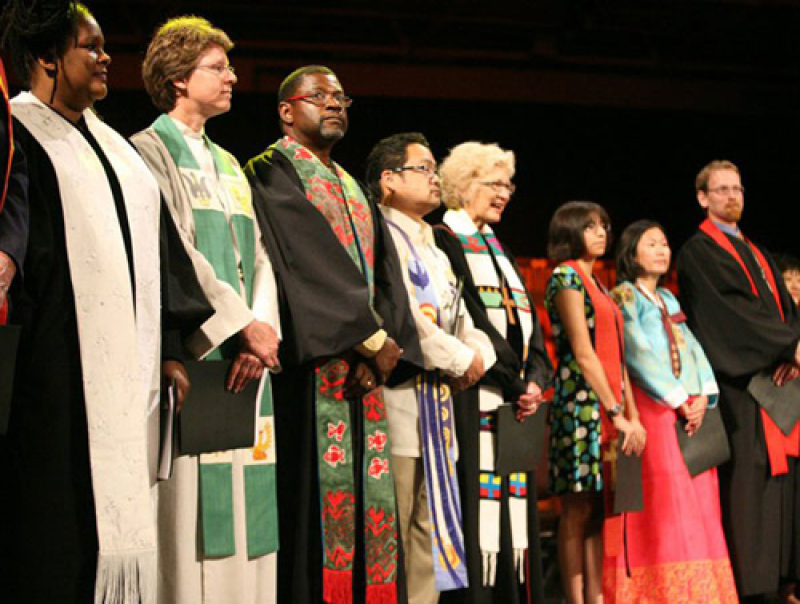

PCUSA leaders at the PCUSA's 219th General Assembly.
The Presbyterian Church (U.S.A.) has decided on Tuesday to include same-sex marriages in its definition of marriage.
The decision was made by way of a vote to amend the PCUSA's Constitution with Amendment 14-F, which would redefine marriage from being "a civil contract between a woman and a man," and "a covenant through which a man and a woman are called to live out together before God their lives of discipleship," to "a unique commitment between two people, traditionally a man and a woman, to love and support each other for the rest of their lives." A side-by-side comparison of the old and new definitions has been made available by the PCUSA here.
The proposed amendment was approved for voting at the PCUSA's last General Assembly in June of 2014, and the finalizing vote came in on Tuesday night, with 86 presbyteries in favor of, and 42 against the amendment. Though not all presbyteries had turned in their votes, just 86 votes out of a total of 172 presbyteries for either position were needed to finalize the vote.
The change in wording within the PCUSA's Constitution, which is called the Book of Order, will take effect on June 21, 2015.
Strong voices of both support and opposition regarding the results have been prevalent since the result was released.
"The change aligns the church's constitution with a reality that has long been true: Both same-gender and opposite-gender couples have been living in relationships that demonstrate covenant faithfulness, shared discipleship, and mutual love," the Covenant Network of Presbyterians, a Presbyterian group that has supported gay marriage, stated on its website. "We rejoice that all couples can now see those relationships solemnized before God and the Christian community in marriage, at the discretion of ministers and sessions."
"In terms of the PCUSA's witness to the world, this vote demonstrates a complete accommodation to the prevailing winds of our culture," said Carmen LaBerge, the president of the Presbyterian Lay Committee, a conservative Presbyterian group. "Any prophetic voice that the denomination may have once had to speak truth and call people to repentance is now lost. All [the PCUSA] can do now is echo the voices of the world, for she has abandoned the clarion call to bear faithful witness to the God who has clearly spoken on this matter."
Though most evangelical churches believe that a marriage is a covenant before God specifically between a man and a woman, several denominations other than the PCUSA have also approved of same-sex marriage, such as the Episcopal Church. The United Methodist Church has been in the process of debating the issue, and the Evangelical Lutheran Church in America gives ministers the choice to officiate or not officiate a same-sex wedding.
Previously, the PCUSA had already allowed individuals with same-sex attractions to be ordained as ministers (through Amendment 10-A), and allowed PCUSA pastors to marry same-sex couples in states in which those marriages are legalized, according to their own discernment and discretion (through a measure called authoritative interpretation (AI)).
PCUSA's moves over the past few years regarding same-sex marriages and individuals with same-sex attractions has led hundreds of disagreeing churches to leave the denomination. Between 2012 and 2013, the number or churches decreased from 10,262 to 10,038, a decrease of 224 churches. Most leave to other, more conservative denominations, including the Presbyterian Church in America (PCA), and the Evangelical Covenant Order of Presbyterians (ECO), to name a few.
With the passing of Amendment 14-F, however, the PCUSA noted that this change in definition does not "compel" pastors or churches to take actions "against his or her judgment."
"It is important to note that the determination of what couple a Teaching Elder will marry has and will continue to be with that Teaching Elder," the PCUSA stated. "Likewise, the determination by a Session as to whose weddings a congregation will host remains solely with the Session. There is nothing in the amendment to compel any Teaching Elder to conduct a wedding against his or her judgment, nor a Session to host one against its judgment."
This article has been updated on March 18, 4:04 P.M. PST.


















